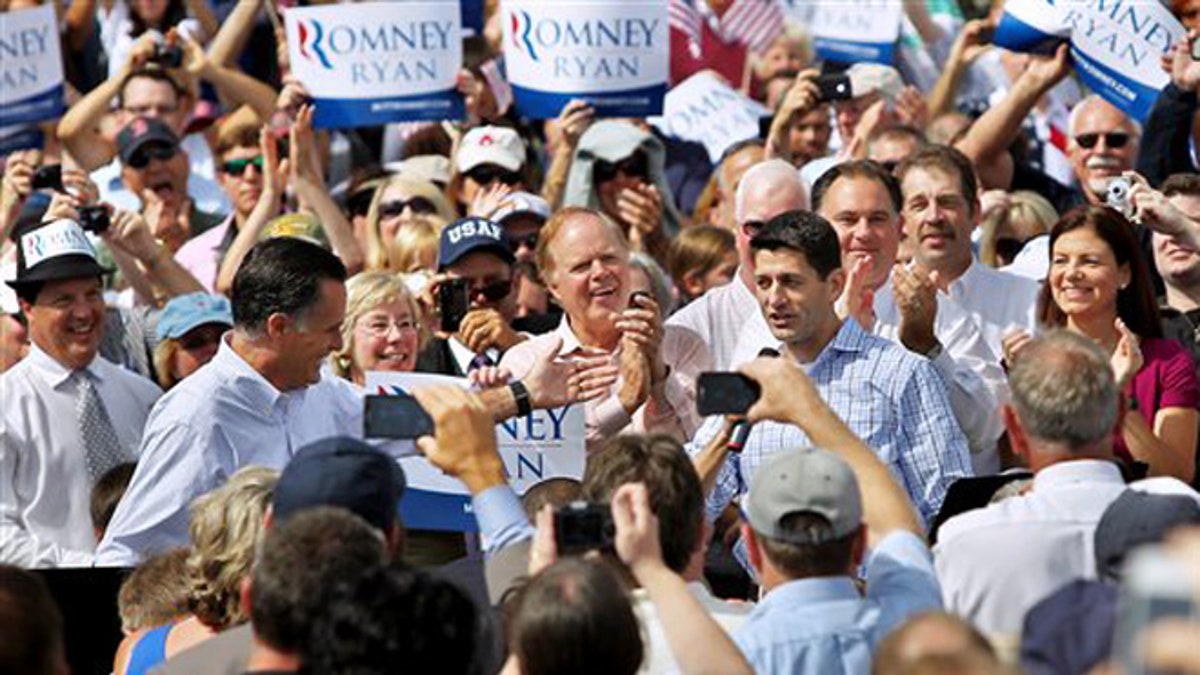
Aug. 20, 2012: Republican presidential candidate Mitt Romney, left, and vice presidential candidate Rep. Paul Ryan, R-Wis., at Saint Anselm College in Manchester, N.H. (AP)
Make no mistake, Mitt Romney’s appointment of Paul Ryan as his running mate has galvanized the Republican base.
But while a recent Gallup poll found a mere 39% of Democrats are now more enthusiastic about voting than in previous elections -- down from 61% in 2008 and 68% in 2004 – this enthusiasm gap has not translated into a significant bounce for Mr. Romney in the polls.
Mitt Romney currently leads by two points in the most recent Gallup polling (45% for Obama to 47% for Romney) and by one point in the latest polling by Rasmussen Reports (43% for Obama just 44% Romney).
This is a below-average “bounce” for the selection of a vice presidential candidate; in past elections, the bounce has averaged in the neighborhood of 4 percentage points instead.”
[pullquote]
What it suggests is that a campaign platform that focuses primarily on the budget, Medicare, and entitlement reform is a losing strategy that is hurting them with seniors, women, and the independent swing voters whose support will be necessary this November.
The Obama campaign has launched a series of attack ads in key swing states which focus on the Ryan Plan – going after Ryan’s plan for deep cuts in Medicare, the nation’s most popular social program after Social Security– to further undermine Romney’s effort to win these core constituencies.
Meanwhile, the Romney campaign has yet to lay out a convincing argument for what their election holds in benefit for working people.
If Mr. Romney hopes to win over these voters before Election Day, he must present a specific plan to revive the economy with a jobs and economic growth strategy for the working and middle class.
Recent polling confirms that voters have a highly pessimistic outlook on the state of the economy and the state of the nation.
According to a Gallup survey released last week, just 36% of Americans approve of Mr. Obama's handling of the economy. Thirty-seven percent approve of his record on job creation. And only 30% are happy with the president's handling of the federal budget deficit.
Indeed, as the Washington Post’s Chris Cilizza pointed out: should Obama win a second term on November 6, he will have defied history, becoming the first sitting president since World War II to win reelection with the unemployment rate above 7.2 percent.
With unemployment (8.3%) above 8 percent for the 8th consecutive month, it is no wonder a new Gallup poll finds 75 percent of us “dissatisfied” with the direction of the country, while a recent CNN survey found that that twice as many Americans (39%-19%) think the economy is still in a recession than think it recovering.
To be sure, when it comes to jobs and the economy, voters view Governor Romney as the lesser of two evils.
The two sides may fight to a draw on Medicare and entitlements, but a Romney-Ryan ticket cannot simply promote a plan to transform Medicare into a voucher system while slashing other programs for the middle class and poor without frank recognition that many Americans are still struggling and rely on the social safety net.
Put simply, if the Romney-Ryan ticket hopes to significantly improve its standing and build support with key swing voting groups, they will need a pro-growth fiscally responsible agenda emphasizing job creation at its core.
